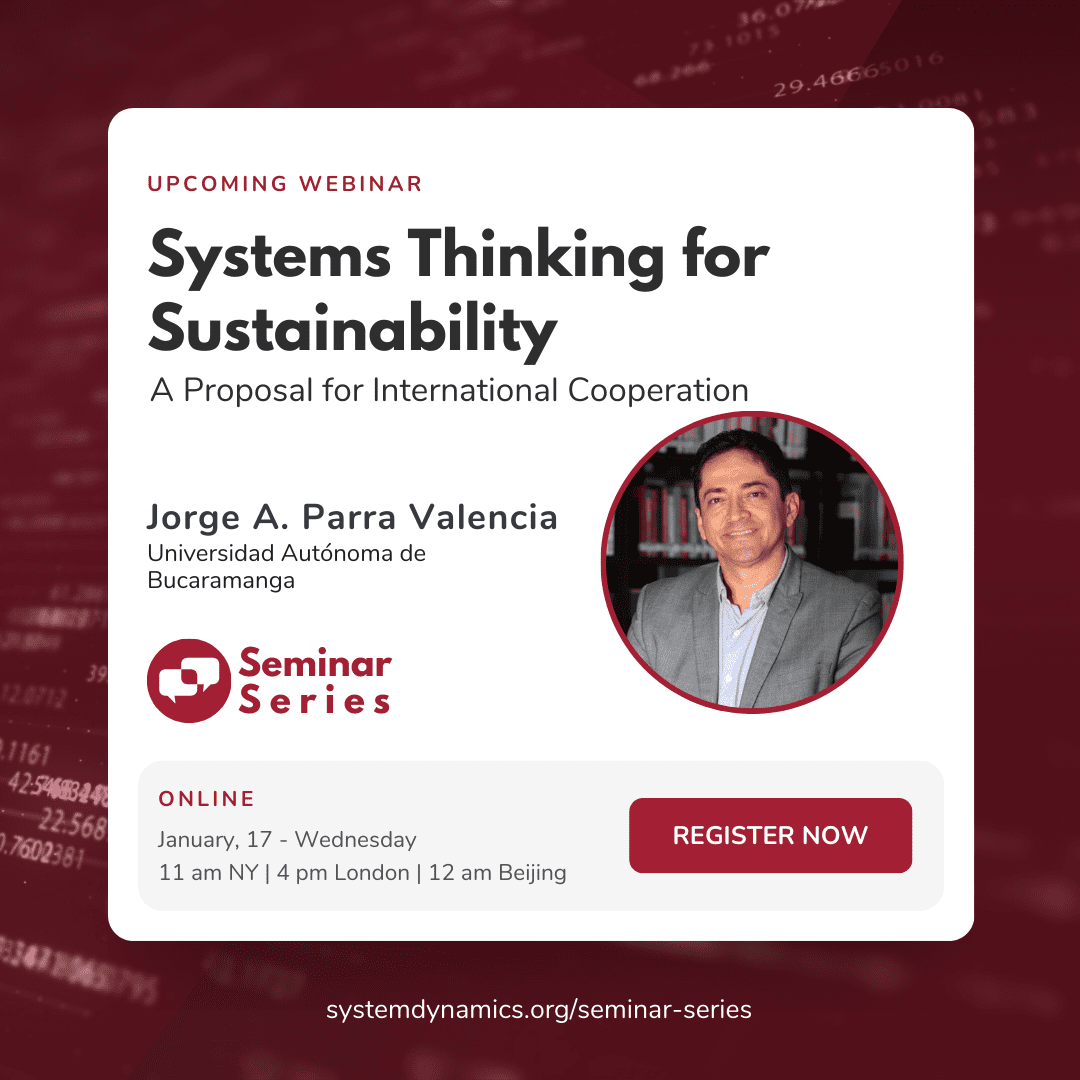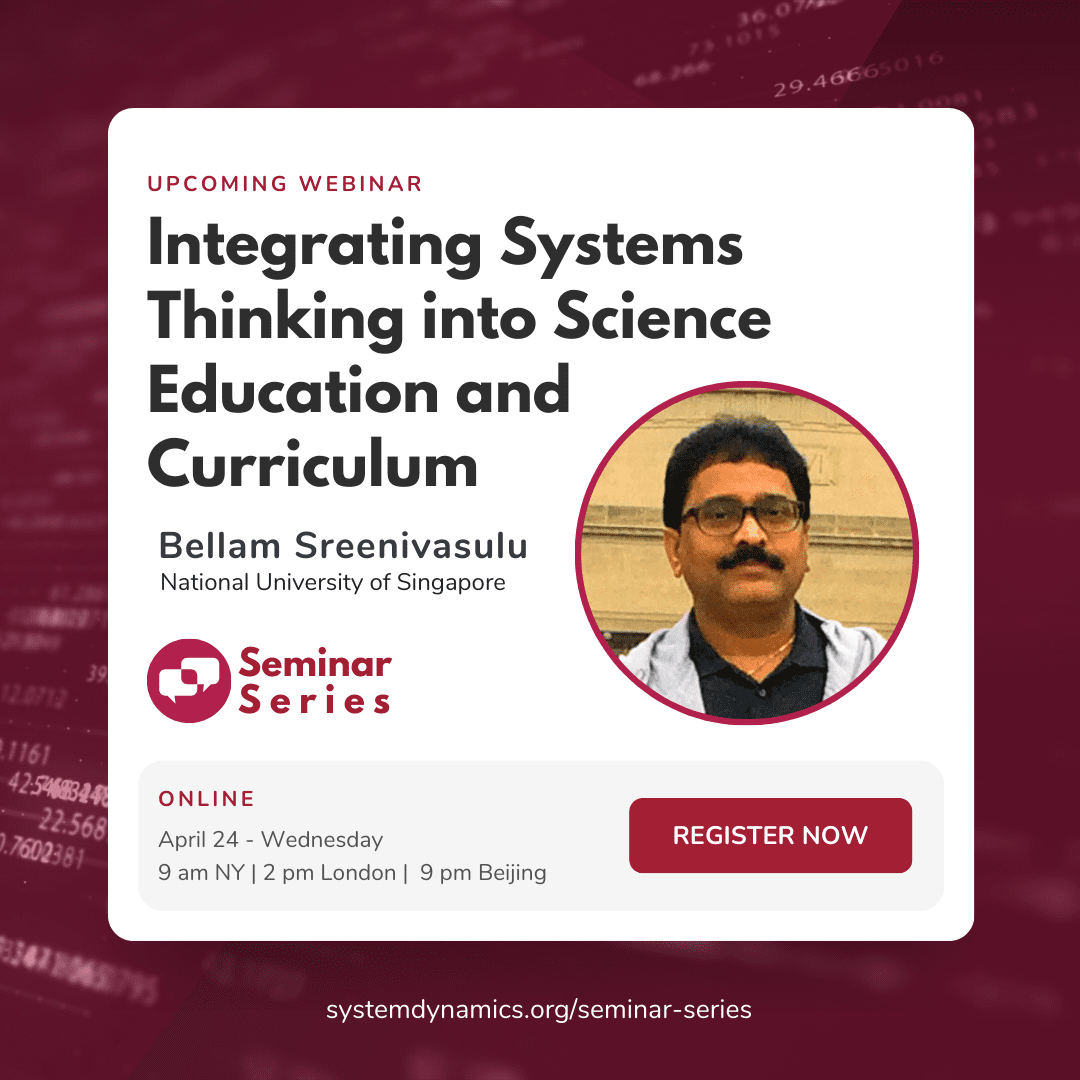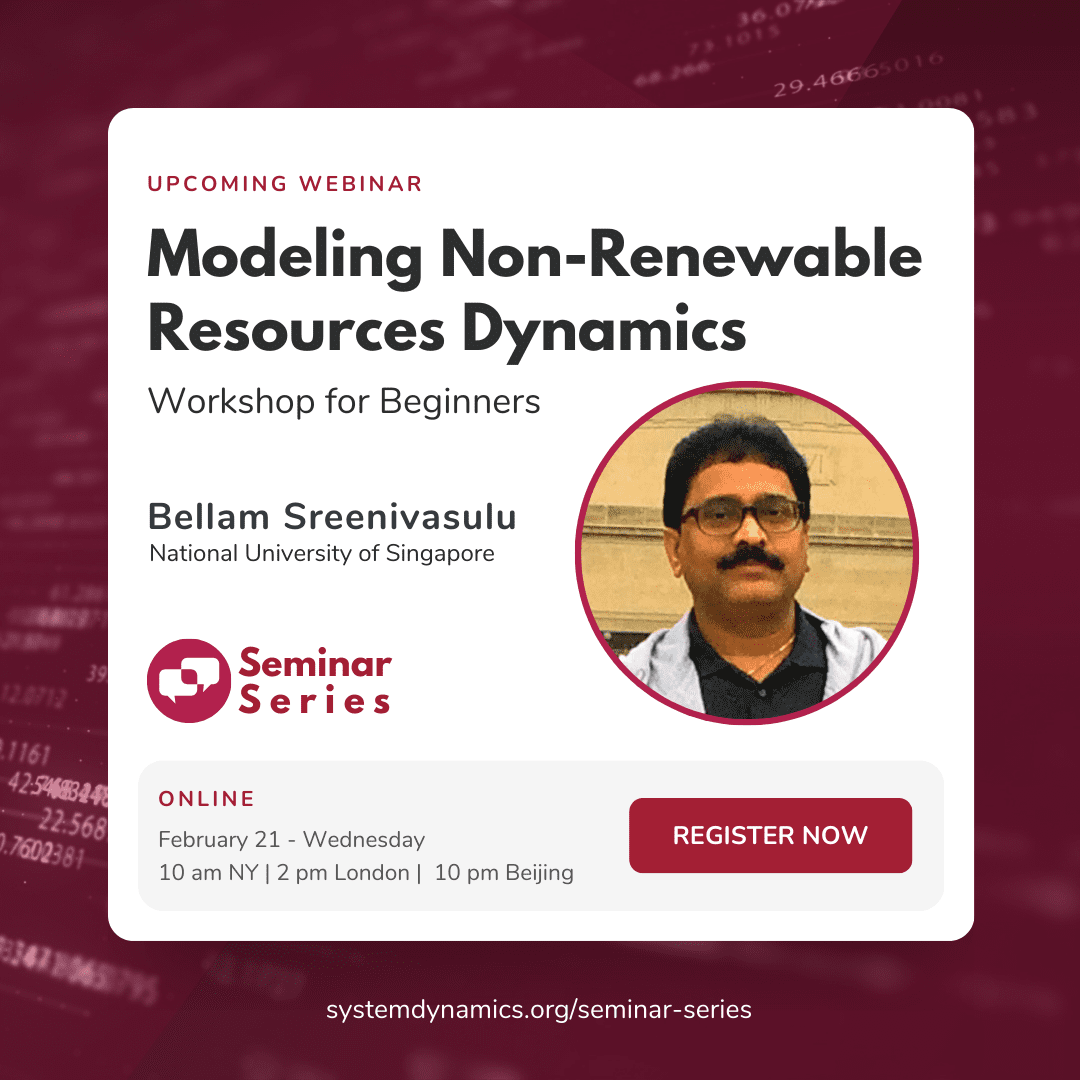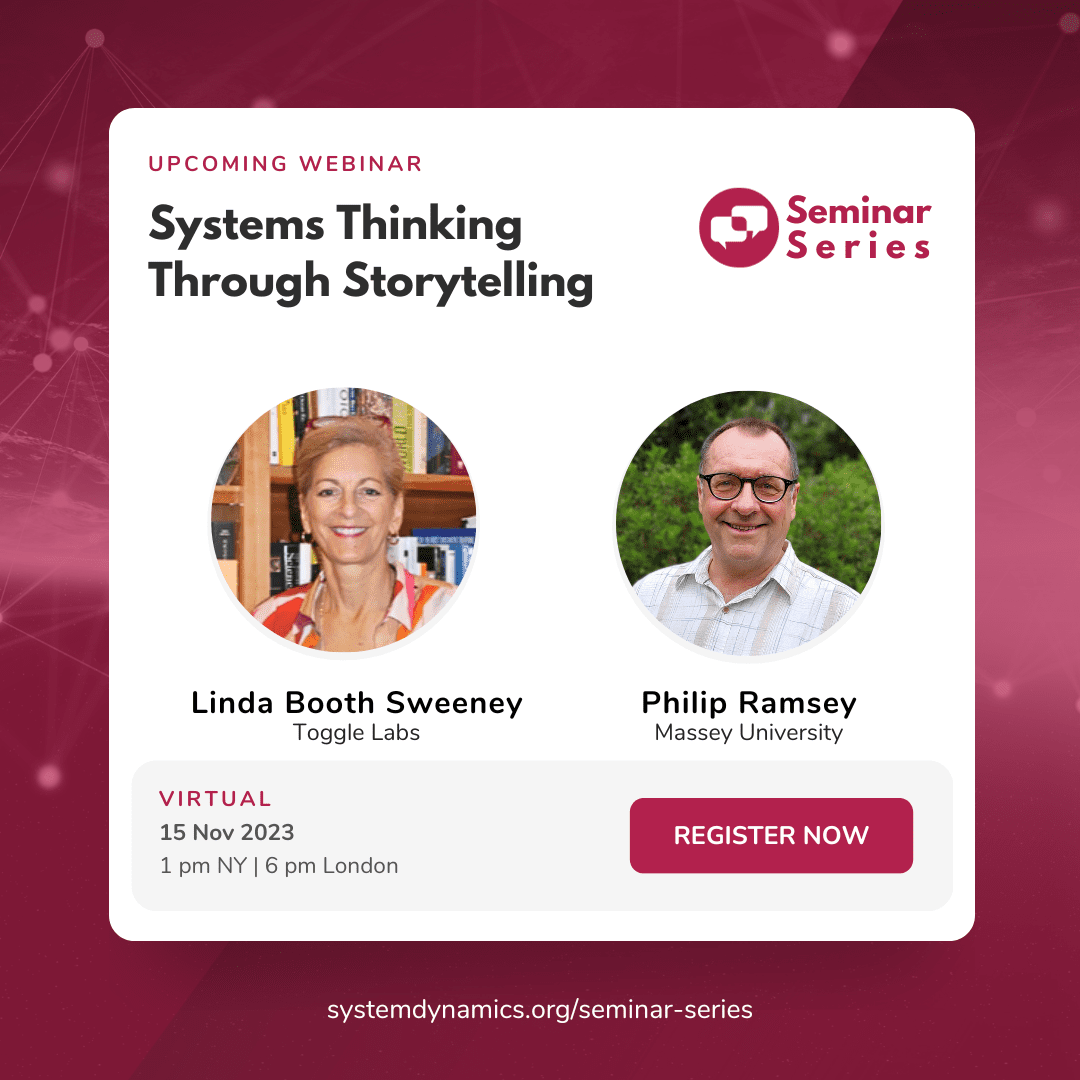Systems Thinking for Sustainability: A Proposal for International Cooperation
January, 17 at 11 am NY | 4 pm London | 12 am Beijing | Time Converter
Systems Thinking for Sustainability: A Proposal for International Cooperation.
The international cooperation proposal “System Thinking for Sustainability” is an initiative led by the Autonomous University of Bucaramanga (UNAB) whose fundamental objective is to address current challenges in favor of global sustainability. It is based on the application of Systems Thinking, a comprehensive approach that seeks to understand and solve complex problems from a holistic and interconnected perspective.
This proposal focuses on promoting sustainable development through collaboration and promoting innovative solutions. Through the analysis of complex systems and the identification of interdependent relationships, it seeks to find strategies to address contemporary dilemmas in key areas such as energy transition, organizational and institutional change for sustainability, water management, cybersecurity and the promotion of education and scientific vocations.
A look at the problems of dissemination of systems thinking: Recognizing the challenges of effectively disseminating Systems Thinking, the proposal focuses on identifying strategies to overcome dissemination barriers and promote a broader and deeper understanding of this approach, promoting its adoption and application in various areas and sectors.
An organizational proposal for coordination to improve impact: The initiative focuses on establishing an effective organizational structure that facilitates coordination between various actors interested in Systems Thinking. It seeks to enhance the impact of this approach by creating collaborative platforms, knowledge-sharing networks and strategies to promote its practical application in relevant contexts.
Development of educational tools and resources: The creation and dissemination of educational materials and practical tools that allow the understanding and effective application of Systems Thinking are sought. This includes the development of digital resources, methodological guides and training programs to encourage greater adoption and understanding of this approach.
About the Presenter
Integrating Systems Thinking into Science Education and Curriculum
April 24, 2024 at 9 am NY | 2 pm London | 9 pm Beijing | Time Converter
Integrating Systems Thinking into Science Education and Curriculum
For teaching and learning science through rich-contexts and complex real-world scenarios, application of systems thinking approaches offers convenient platform. This framework can be well integrated into problem-based learning, learning from case studies, project-based approaches etc. Compared to reductionist approach, systems approach will also facilitate students’ holistic and interdisciplinary understanding about a complex problem. Along these lines, this seminar focuses to explore the scope of applying systems thinking concepts into science teaching and curriculum with a focus in the context of chemistry teaching and learning.
About the Presenter
Dr. Bellam Sreenivasulu, Senior Lecturer and Resident Fellow at the Residential College-4 (RC4), National University of Singapore (NUS), holds a Ph.D. in Chemistry and a postdoctoral fellowship from the Institute of Chemical and Engineering Sciences (ASTAR, ICES). He has extensive teaching experience in chemistry and applied chemistry such as supramolecular chemistry. Currently, at RC4, Dr. Bellam specializes in systems thinking and system dynamics (ST&SD) curriculum with a focus on modeling real-world complex problems in relation to energy systems- sustainable energy, renewable energy, carbon emissions etc. He also teaches topics such as ‘Sleep Health for Holistic Wellbeing’ applying systems thinking approach. His educational research interests include chemistry education, ST&SD education exploring students’ learning and misconceptions in these areas.
Hands-On Workshop: Modeling Non-Renewable Resources Dynamics
Feb 21, 2024 at 9 am NY | 2 pm London | 10 pm Beijing | Time Converter
Hands-On Workshop: System Dynamics Modeling Non-Renewable Resources Dynamics
This session about modeling the depletion of non-renewable resources is intended to enable participants to understand the problem holistically through systems approach. First, they will learn to construct causal loop diagrams (feedback loops) by applying systems thinking concepts, and then learn to develop stock and flow diagrams as models for simulations to study how a system structure generates the behavior of overshoot and collapse of non-renewable resources. At the end of this session, the participants will be enabled to:
- Identify the cause and effect interactions among the key variables in the given system scenario to develop feedback loops
- Build stock and flow diagram to quantify the model on Vensim
- Run the simulations on Vensim to observe predicted dynamic behavior
- Propose policies for sustainable use of resources
This hands-on practice session is intended to engage beginners in the field of systems thinking and System Dynamics. It is expected to run for 2 hours.
Download the Software
This workshop will make use of Vensim PLE, the free version of the modeling software provided by Ventana Systems. To ensure efficient use of time during the workshop, we kindly ask all participants to download the software in advance from https://vensim.com/free-downloads/
Pre-Work Tasks
Before attending the workshop, please complete the PRE-WORK TASKS to ensure a productive learning experience:
- Watch the introductory segment (up to 10 minutes) of the video on ‘drawing causal loop diagrams (CLDs) in Vensim’ to familiarize yourself with the basics of CLD creation in Vensim. Access the video here: Vensim Causal Loop Diagramming Video.
- Practice drawing CLDs by replicating the example shown in the video. Once comfortable, save your version of the CLD in the ‘.mdl’ format with your name as the filename.
- Learn about constructing simple Stock and Flow Models in Vensim by watching the relevant video. This will provide foundational knowledge in creating stock and flow diagrams (SFD). Access the video here: Building a Simple Vensim Model.
About the Instructor
Dr. Bellam Sreenivasulu, Senior Lecturer and Resident Fellow at the Residential College-4 (RC4), National University of Singapore (NUS), holds a Ph.D. in Chemistry and a postdoctoral fellowship from the Institute of Chemical and Engineering Sciences (ASTAR, ICES). He has extensive teaching experience in chemistry and applied chemistry such as supramolecular chemistry. Currently, at RC4, Dr. Bellam specializes in systems thinking and system dynamics (ST&SD) curriculum with a focus on modeling real-world complex problems in relation to energy systems- sustainable energy, renewable energy, carbon emissions etc. He also teaches topics such as ‘Sleep Health for Holistic Wellbeing’ applying systems thinking approach. His educational research interests include chemistry education, ST&SD education exploring students’ learning and misconceptions in these areas.
Systems Thinking Through Storytelling
1 pm NY | 6 pm London | 2 am (Nov 16) Beijing | Time Converter
Systems Thinking Through Storytelling
Join us for a free seminar with Linda Booth Sweeney and Philip Ramsey, systems educators and authors whose books help teach about systems thinking through storytelling.
Linda will share “Curious about Connections,” a simple, inquiry-based teaching framework that fosters collaborative, inclusive dialogue while promoting systems thinking, critical thinking, communication skills, and empathy. She’ll demonstrate how to use this facilitation method using picture books as well as everyday scenarios. She is excited to share this facilitation method with our System Dynamics community and to explore ways families, teachers, and professionals can use it in a variety of settings.
Phil will share about his newly published Billibonk and Frankl book series, a collection of captivating jungle-based fables that showcase principles of systems thinking through the experiences of various animal characters. The stories are engaging and relatable to both children and adults, as they demonstrate how different species in the jungle learn to collaborate and solve problems together. The Billibonk and Frankl stories aim to help children see systems and interdependencies in the world around them.
About the Speakers
Linda Booth Sweeney is an educator, writer and strategist for healthy socio-ecological systems change, Dr. Linda Booth Sweeney is internationally recognized for her efforts to make systems thinking actionable by a wide range of audiences. In her Systems Leadership Labs, Linda creates experiences for leaders to think differently, and to experiment with language, visualization tools and knowledge architecture that better mirrors the complexity they are navigating. She is co-author of The Systems Thinking Playbook, The Climate Change Playbook, and numerous other books and journal articles. Her next book, Apart Together, is a gentle introduction to systems thinking for children and will be published by Balzer & Bray in October 2023. Linda holds her doctorate from Harvard’s Graduate School of Education and lives outside of Boston where she enjoys swimming in Walden Pond and amateur farming. For more information, see:
(systems), www.lindaboothsweeney.net
(children’s) www.lindaboothsweeney.com
(metaverse) https://togglelab.com
Phil is a Senior lecturer at Massey University in New Zealand, where he teaches Organizational Learning, Leadership, and Teamwork. He also works as a Director of Incite Learning, a consulting company that mainly works with schools, helping school leaders apply Organizational Learning concepts to solve tough problems.




